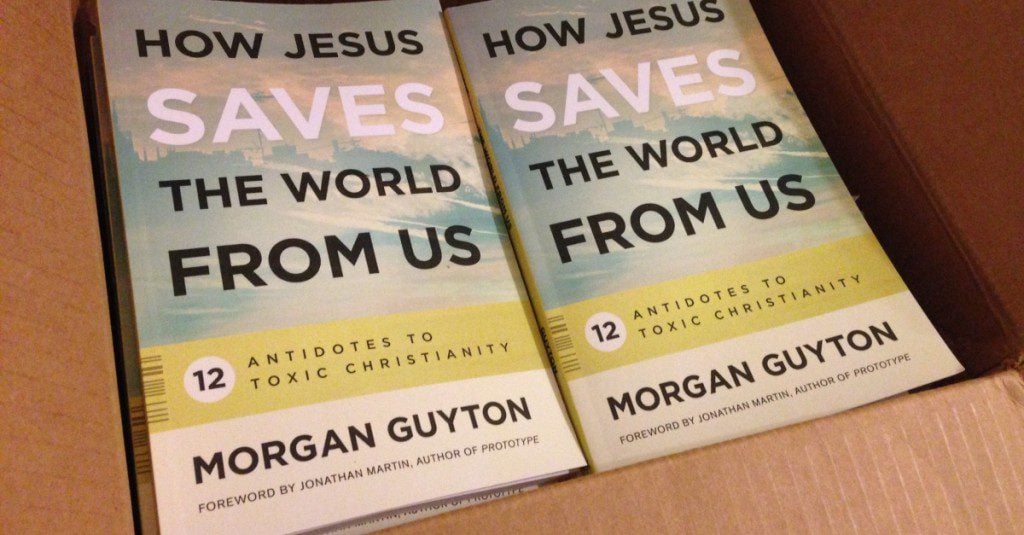Several recent reviews have expressed ambivalence about my book, particularly the 10th chapter Outsiders Not Insiders. Though I generally tried to be less strident and more gracious than I sometimes am on the blog, I’m curious to hear your feedback about whether I overreached or expressed myself in an unnecessarily alienating way. So I decided to share an excerpt from that chapter for your consideration.
[EXCERPT FROM OUTSIDERS NOT INSIDERS]
Before Jesus got killed, he warned his disciples about what was going to happen: “If any want to become my followers, let them deny themselves and take up their cross and follow me. For those who want to save their life will lose it, and those who lose their life for my sake, and for the sake of the gospel, will save it” (Mark 8:34–35). Many of us Christians learn when we’re growing up that we’re supposed to “take up our cross and follow Jesus.”
What this usually means in white Christian youth group is that we make some sacrifices like avoiding sex, drugs, and cuss words. The cross is a metaphor for a minor hardship or self-discipline that we embrace voluntarily. But is that what Jesus really meant by it? How did we get the idea that setting some limits for your behavior is the same thing as losing your life for Jesus’ sake? It sure looks as if our insider Christianity has domesticated the cross.
If Jesus really said these words before the apostle Paul turned the cross into a metaphor for spiritual discipline, then they could not have had the spiritualized meaning they’ve acquired for insider Christians today. When Jesus first spoke of the cross, it meant one thing: the most brutal, dehumanizing form of capital punishment in the Roman Empire. To take up your cross meant joining the procession of condemned criminals being marched out of the city gates to Golgotha hill to be executed. It meant getting stripped, beaten, and spat upon by Roman soldiers. It meant being abandoned by your friends. It meant the total loss of your status and dignity. It meant becoming a complete outsider…
Jesus said, “If the world hates you, be aware that it hated me before it hated you. If you belonged to the world, the world would love you as its own. Because you do not belong to the world, but I have chosen you out of the world—therefore the world hates you” (John 15:18–19). It cannot be stated any more clearly that Christians are called to be outsiders. But the million-dollar question is, who’s the world I’m not supposed to be a part of? For insider Christians, “the world” has a very limited definition. It’s Hollywood, the music industry, or anybody whose clothes are too sexy. “The world” cannot refer to Wall Street investors or the country club or the good-old-boy network in your local business community. “The world” is definitely not the well-dressed, well-fed group of people who share your pews on Sunday morning.
James 4:4 says, “Do you not know that friendship with the world is enmity with God?” The best way to sidestep James’s exhortation is to give yourself a very limited “world” to avoid being friends with. You can live in your gated community and keep the BMW, the water-ski boats, and the Colorado chalet, as long as you don’t let your kids watch MTV or R-rated movies. You can make peace with your worldly extravagance, as long as you get together with other insider Christians to lament how the world is going to hell in a hand-basket. The best thing is to find something to feel persecuted about, so you can call it your “cross” without actually having to lose your worldly status or your air-conditioned lifestyle.
But what if we’re “the world” that Jesus is saving the rest of the world from? If I’m invested in preserving my authority in the order of command and obedience, could I be part of “the world” that stands in the way of God’s kingdom? As long as my legitimacy is my most cherished value, then I will co-opt Christianity to validate my lifestyle and manufacture a custom “cross” for me to carry that’s heavy enough to feel like a workout, but doesn’t demand the radical self-renunciation Jesus went through on Golgotha hill.
Consider Jesus’ parable of the great banquet in Luke 14. He tells the story of a king who gave a great feast and invited his rich friends. When it was time for the banquet to start, the friends all made excuses. One had just bought a piece of land and needed to see it. Another had to test out a new set of oxen. A third had just gotten married. When the king heard this, he sent his servant back out, saying, “Go out at once into the streets and lanes of the town and bring in the poor, the crippled, the blind, and the lame.” It was a banquet attended completely by outsiders.
For many years when I read this parable, I glossed over the friends’ excuses. I didn’t appreciate what a critical part of the story they were. They aren’t just made-up excuses; they’re real-life priorities that keep us from hearing God’s call. The reason insiders cannot enter God’s kingdom is because we’re invested in worldly obligations we dare not question. We’re buying land and testing out oxen. We’re completely preoccupied by our career advancement, our Pinterest-perfect homes, and our kids’ college tuition. So we blow off God’s invitation. People without land to buy or oxen to test are much more available to receive God’s kingdom.
The problem is that insiders have no idea we’re rejecting God’s kingdom banquet because we’ve renarrated the Christian story into a validation of our lifestyle. Instead of seeking God’s kingdom first, we focus on our own nuclear families and spin this into Christianity’s top priority. As long as we avoid sex outside of marriage and keep our kids from doing so, we don’t have any further obligations to fulfill. Our moral purity gives us the basis for washing our hands of the plight of the poor and marginalized, whose circumstances are understood to reflect their immorality. Insider Christians may thank God for our blessings before every meal, but we don’t realize that we’re not sitting at God’s table unless we’re sitting with the outsiders.
This is the oversight revealed in the parable of the Rich Man and Lazarus. Jesus says that a rich man “feasted sumptuously every day” while “at his gate lay a poor man named Lazarus . . . who longed to satisfy his hunger with what fell from the rich man’s table” (Luke 16:19–31). We aren’t given any other details about the rich man’s life. He may have tithed. He may have kept his children from having sex until they were married. He may have avoided alcohol, cigarettes, and swear words. He may have even pulled himself up by his bootstraps and worked hundred-hour weeks for every penny that he had. But he missed God’s banquet. Because Jesus was sitting outside his gate with Lazarus. And so the rich man went to hell.
Jesus’ most graphic illustration of hell mentions nothing about the moral priorities of today’s insider Christians. The rich man couldn’t have avoided hell by leading a perfectly “biblical” lifestyle. No verse in the Bible explicitly commands people to invite beggars off the street to eat at their table. But the rich man didn’t do it, and that’s why he went to hell. When was the last time you invited a homeless person into your home to eat at your table? I sure haven’t. Clearly this was a major priority for Jesus, if he made a parable in which not sharing your table with outsiders was by itself a damnable offense. It’s all good because Jesus died for my sins and I accepted him as my Savior. Right? Maybe, but I’m not sure he’ll be happy with me if I blow off his parable on account of his grace.
I have shared a table with outsiders before, but it wasn’t through any magnanimity of my own. As a deeply troubled and hurting young man, I was welcomed into a church of outsiders who showed me a gospel I had never seen before. I was living in a dilapidated artist’s colony in Toledo, Ohio. It was a socially turbulent environment filled with drugs and sexual promiscuity. I was going through a time of deep depression, so partying late into the night became my form of self-medication.
When I saw my life spiraling out of control, I decided to go back to church. The closest one I could find was Central Avenue United Methodist Church. When I walked through the door for the first time, it became clear that I was one of maybe three or four straight people in the room. If you’ve never been to a church of outsiders before, it’s a completely different experience. I wasn’t blinded by the shiny, happy Jesus smiles of self-assured insiders who know they’re right and they’re winning. Everyone in the room moved and spoke with a meek tenderness that only the wounded can authentically embody. I felt completely safe and welcome in their midst.
I started going to a Bible study led by the unofficial, unordained lesbian co-pastor who had the spiritual vigor and passion for Christ I’d always associated with evangelicals. I started meeting weekly with a lesbian social worker who wouldn’t charge me for our visits but asked instead that I give a weekly offering to the church. Mothered by these and other gentle lesbians in that church, I began to heal from my depression and the sinful, chaotic lifestyle that was exacerbating it. I didn’t change because of the peer pressure of a rigorous accountability group to whom I was confessing my sin. I changed because I was accepted unconditionally by people who had been rejected by the church. In that space of unconditional acceptance, I learned how to stop hating myself and open my heart to God’s generous love. Everything I’ve learned since then and everything I’ve written in this book is an outgrowth of the gospel I received from this outsider church that embraced me. If the queer people who shaped me are not qualified to serve God as fully ordained pastors, then I’m not either.
On my blog, I’ve tried to make an exhaustive biblical case for why being queer isn’t sinful. I’ve almost given up on trying to argue, because it seems like so many insider Christians are so invested in their anti-LGBTQ stance that it’s become their litmus test for Christian identity. When you accept Christians with a spectrum of views on every other theological issue, but excommunicate them for accepting queer people, there must be more going on than loyalty to the Bible’s truth. To me, there is no greater perversion of Christianity’s outsider orientation than to turn Jesus’ language about taking up your cross, renouncing privilege, and facing persecution into an ideological stance to package yourself as a “persecuted outsider” by rejecting outsiders. LGBTQ people have become scapegoats for many insider Christians who were looking for a way to feel like the world’s scapegoats. Just because our culture has started to shift into accepting queer identity doesn’t mean that we can obfuscate our way out of Jesus’ call to radically renounce our worldly privilege by using the gay issue to solicit “persecution” from “the world.”
I believe that queer people have an important role in dismantling insider Christianity. I discovered 1 Corinthians 1:28 a couple of years after I received the gospel from them. It’s the apostle Paul’s most radical prophecy: God has chosen the world’s despised outsiders to bring to nothing the things that are. What if queer people have been chosen by God to smash an ideological system that has kept Christians from living out the gospel? What if they are the means by which we will finally be liberated from our “friendship with the world”? This is the view of St. Louis pastor Rev. Osagyefo Uhuru Sekou, who was asked about how the church has responded to the Black Lives Matter movement: “The young people in the street disturb our religious respectability and sensibility. Queer women, single moms, pants sagging, tattoos—it disrupts the very character that the church presents to the world. I’m not terribly hopeful for the church. I think queer, black, poor women are the church’s salvation. They don’t need to get saved. The church needs to get saved.”
Even if you believe that the Bible disapproves of homosexuality, perhaps you could still agree that insider Christianity’s overprioritization of sexual purity has falsely exonerated Christians from obeying Jesus’ call to love our neighbor and welcome Lazarus at our table. As long as the gospel is co-opted into an order of command and obedience—whether it’s organized according to race, gender, sexuality, or something else—then Christians will remain immunized against the cry of Lazarus. But if our fixation on sexual issues as a mark of legitimacy can be shattered, then perhaps we can be saved from our chains to worldly privilege.
I’m not calling for an abandonment of holiness but for a reinterpretation of its purpose. We are just as useless to the world’s outsiders when we are enslaved to our fleshly appetites as when we are exonerated by our moralistic meritocracy. We must fast and temper our flesh into full spiritual vitality if we want to be servants to the marginalized. We must be emptied of both our privilege and our idolatry if we want to take up our crosses and join the fellowship of the crucified. The one idol that is most important to eradicate is our legitimacy. If we want to experience the true freedom of Golgotha hill, we must renounce every order of command and obedience that makes us insiders and makes others into outsiders. We must become outsiders like our crucified king.
















